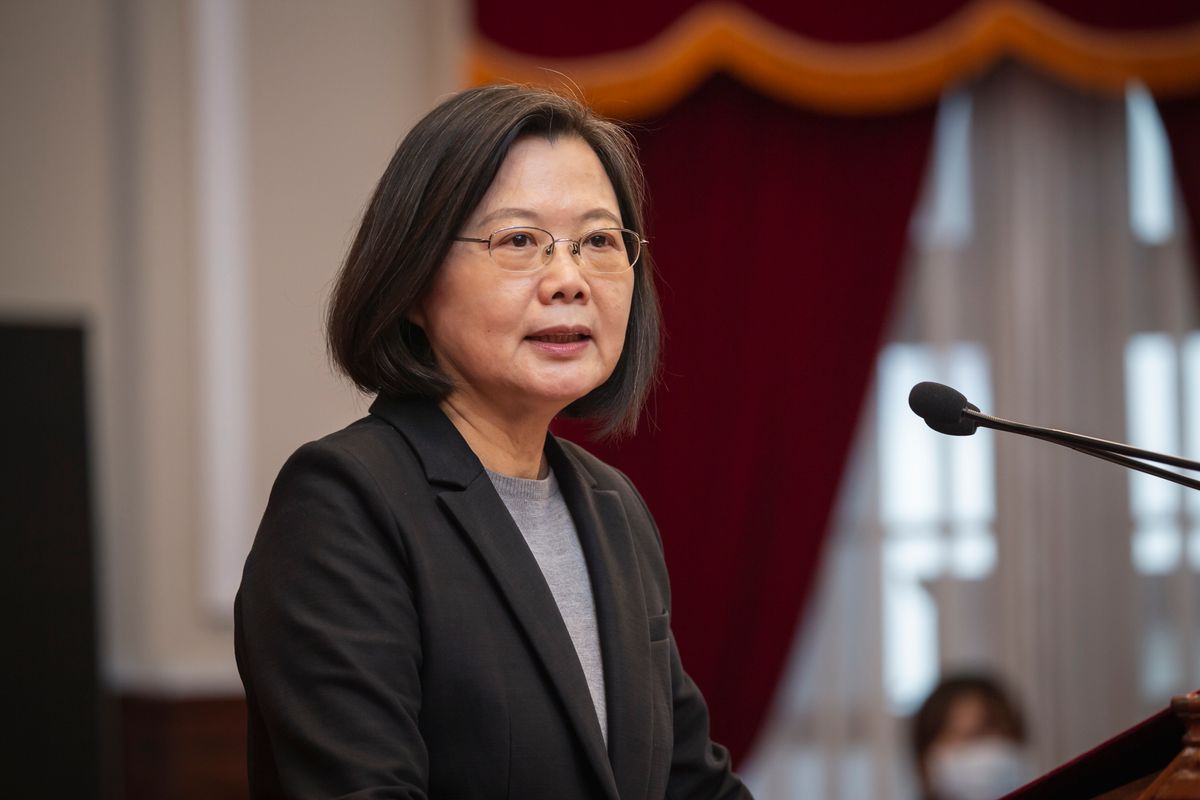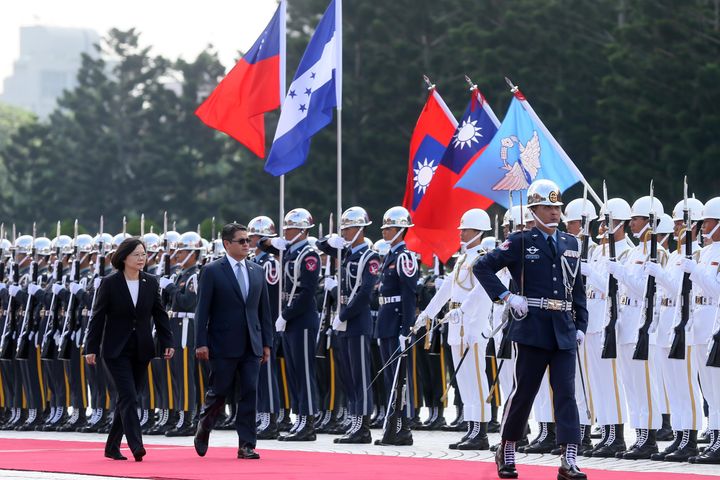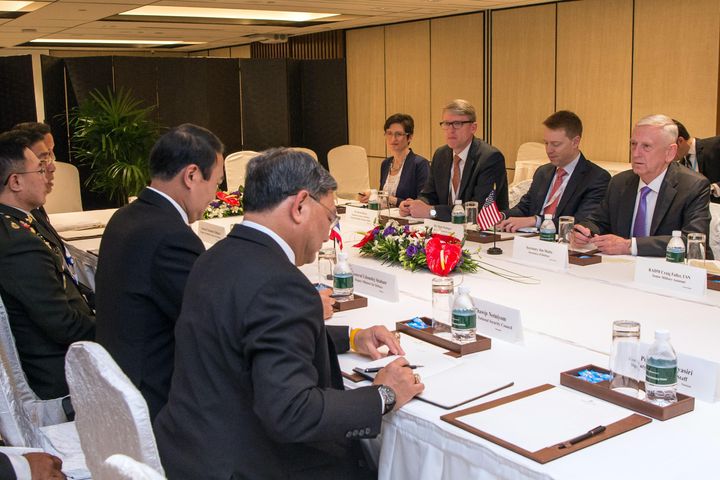China sanctions US organizations, Taiwan's US envoy

The Lede: China has imposed sanctions on two American organizations, the Hudson Institute and the Ronald Reagan Presidential Library in California, for their involvement in hosting Taiwan's President Tsai Ing-wen during her stopover in the United States that Beijing has continuously criticized. According to the announcement made by the Chinese Ministry of Foreign Affairs on Friday, the two organizations are prohibited from cooperating, exchanging, or engaging in any transaction with individuals or institutions in China, while their key leaders cannot visit China, transact or collaborate with organizations or individuals there, and their assets in the country will be frozen.
What we know:
- During her recent 10-day international tour, which included official visits to Central America, Taiwan's President Tsai Ing-wen made stopovers in the U.S. where she met with U.S. House Speaker Kevin McCarthy, R-Calif., at the Ronald Reagan Presidential Library in Simi Valley, California, and received a Global Leadership Award from the Hudson Institute in New York City.
- According to the Taiwan Affairs Office, China also imposed sanctions against the Prospect Foundation and the Council of Asian Liberals and Democrats, both Taiwanese organizations. The spokesperson for China's Taiwan Affairs Office of the State Council, Zhu Fenglian, alleged that the groups were advocating for Taiwan's independence and declared that they could no longer cooperate with organizations and individuals on the mainland, nor could their directors enter the territory.
- China has announced additional sanctions against Hsiao Bi-khim, who serves as Taiwan's representative in the United States, barring her and her family members from entering mainland China, Hong Kong, and Macau. Investors and companies affiliated with Hsiao are also prohibited from engaging in any cooperation with organizations or individuals on the mainland. Hsiao already had been sanctioned by China following then-House Speaker Nancy Pelosi’s visit to Taiwan in August.
- Taiwan has called the newly-imposed sanctions “irrational and absurd.” For the second day in a row, China's naval vessels and aircraft were observed close to Taiwan on Friday, April 7, according to Deutsche Welle. Taiwan's Ministry of National Defense reported that in addition to three Chinese warships that were seen in the waters surrounding the autonomous island, a fighter jet and an anti-submarine helicopter also flew within Taiwan's air defense identification zone.
The background: China has long claimed Taiwan as part of its territory and has refused to recognize it as an independent state. The Chinese government has repeatedly warned against any moves towards independence by Taiwan and has not ruled out the use of force to bring the island under its control. In recent years, China has increased its military activities in the Taiwan Strait and has sought to isolate Taiwan diplomatically by pressuring other countries to sever ties with the island.
The U.S. government has no formal diplomatic relations with Taiwan but maintains significant unofficial and economic connections with the island nation. Prior to becoming the speaker, McCarthy expressed his intention to visit Taiwan, following Pelosi's visit in August. China's military drills around Taiwan in response increased the tensions over Beijing's claim to the island nation.
According to federal law, Washington must ensure that Taiwan has the capability to protect itself in the event of an attack by China. The Taiwan Relations Act, passed by the U.S. Congress in 1979, requires the U.S. government to "consider any effort to determine the future of Taiwan by other than peaceful means, including by boycotts or embargoes, a threat to the peace and security of the Western Pacific area and of grave concern to the United States." During his visit to Taiwan on Friday, Republican congressman Michael McCaul emphasized the urgency of accelerating the delivery of weapons to the island as a crucial step in strengthening Taiwan's defense capabilities. As chair of the House Foreign Affairs Committee, McCaul stated that his delegation is actively seeking to expedite weapon delivery and promote peace in the region, suggesting reprioritizing weapon sales to Taiwan or using third-party sales as potential ways to speed up the process.
Likely outcomes/Takeaway:
- Compared to its reaction to Nancy Pelosi’s visit to Taiwan, Beijing's response to the recent meeting between President Tsai Ing-wen and Kevin McCarthy has been relatively subdued. In August Beijing conducted large-scale military exercises around the island and suspended various communication channels with Washington. But so far there has been no significant military retaliation towards Taiwan after Tsai’s stopover in the United States. According to Reuters, the U.S. and Taiwan have taken measures to make the recent trip less provocative for China's leaders. These measures include holding the meeting between Tsai and McCarthy in California rather than in Washington or Taiwan and limiting Tsai's public appearances through a carefully planned agenda.
- This week, French President Emmanuel Macron and European Commission President Ursula von der Leyen are scheduled to visit Beijing, as China seeks to improve its strained relations with Europe. These visits may potentially influence Beijing's response to the recent developments with Taiwan, considering that Xi Jinping is currently trying to present China as a peacemaker in Ukraine, as well as promote the Chinese yuan in trade agreements with European countries.
- The United States' longstanding support of Taiwan, including through the provision of weapons, continues to be a contentious issue for China, which sees it as an unwarranted interference in its internal affairs. The ongoing tensions between China and Taiwan are likely to persist, with the situation potentially escalating further if China's stance towards Taiwan becomes increasingly aggressive.
- At this point, it’s unclear if the Hudson Institute and the Ronald Reagan Presidential Library leaders have assets in China that would be affected by recent measures.
Quotables:
- “The Hudson Institute and the Reagan Library have provided a platform and facilitated Tsai’s separatist activities… which seriously undermines China’s sovereignty and territorial integrity.” – China’s Ministry of Foreign Affairs.
- “Wow, the PRC just sanctioned me again, for the second time.” – Hsiao Bi-khim, Taiwan representative to the United States.
- "We want to do everything possible to deter a very aggressive nation, Communist China, from ever thinking about landing on the shores of this beautiful island, because that would be a serious mistake for everybody." – Michael McCaul, the Chair of the House Foreign Affairs Committee.
- “We are sticking to our “One China” policy. But we are equipping Taiwan with what it needs to defend itself against any form of aggression. We are taking that very seriously.” – Antony Blinken, U.S. Secretary of State.
Good Reads:
China imposes sanctions on Taiwan's US envoy, US institutions (Reuters)
China sanctions Reagan library, others over McCarthy’s meeting with Taiwan’s president (The Los Angeles Times)
Opinion Listen to Taiwan’s pleas, not China’s grumbles (The Washington Post)



